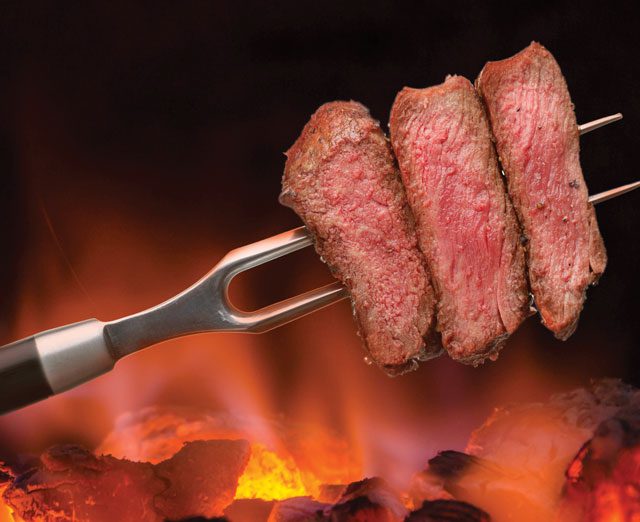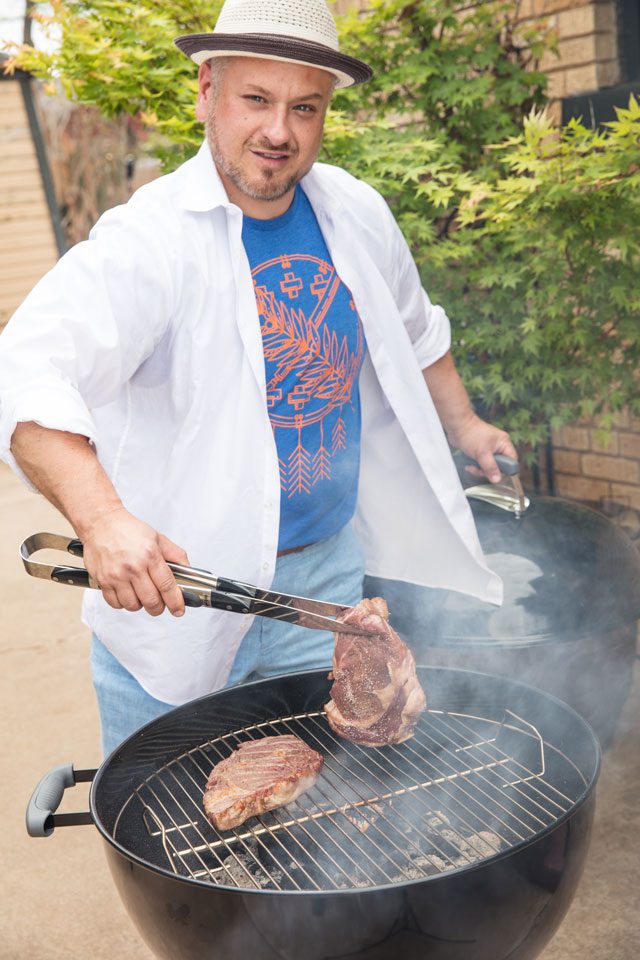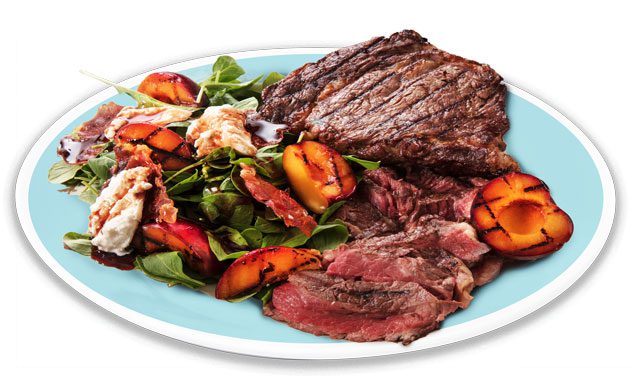
[dropcap]P[/dropcap]erhaps no smell evokes spring in Oklahoma as much as a freshly fired grill. Oklahomans take grilling and barbecue seriously, and while the spring may come with additional chores such as mowing the lawn, it also provides a reason to get out of the kitchen and do some outdoor cooking. From essential grilling tools to tips from chefs, we look at one of Oklahoma’s favorite foods.
The Caveman Cometh
Chef Scotty Irani explains how his inner Neanderthal emerges to grill the perfect steak. When man first discovered and protected fire millions of years ago, it was not something kept sacred because it provided warmth for his family and protection from wild animals and enemies. No, it was sacred because how else was he going to grill that brontosaurus T-bone?

Now don’t start commenting on how early man and dinosaur did not exist at the same time. I got it! My point is that from the dawn of man and his discovery of fire, sure as you are sitting down reading this article, man discovered how to grill meat outdoors. It is primal instinct.
Cooking our food outside is wired into our DNA. It is the smell of slowly rendered fat hitting the fire with a sizzle and spatter. It is smelling that aroma from the clouds of smoke billowing up from the heat source, knowing that we are feeding ourselves and our families, and sustaining the human race.
Actually, it is simply outdoor grilling, and it’s what we Oklahomans do!
Oklahomans are notorious for grilling, and thank you, fire, for that. From early spring through the first frost of autumn, we grill, be it a boneless leg of lamb in spring for Easter or smoking a ham in the homemade smoker your daddy welded together. The Fourth of July features steaks, burgers and hot dogs at the lake. In autumn, we tailgate outside Boone Pickens Stadium (hey, I’m a proud OSU alumnus; go write your own article). Whatever grilling event it is, we are there with charcoal or propane and something good is about to hit that grill.
Speaking of charcoal and propane for grilling, what gives? Well, that kind of depends on taste. Growing up in Sapulpa in Creek County (Salute!) and with Persian kabobs, ribeye steaks and barbecued chicken, I can tell you my preference is charcoal. It adds a grilling flavor synonymous with summer. Those pillow-shaped carbon briquettes mixed with mesquite wood shavings bring out the inner caveman in me. The whole act of building the briquettes into a pyramid just so, lighting them, kicking back with a cold beverage and waiting for the ice-white briquettes to glow red is the perfect pre-party for what is about to be dinner.
The challenge with charcoal is just what I described. It takes some time to get those coals white hot and it takes patience. There is also the mess and cleanup afterward. With our recent dry spells in Oklahoma, the danger of accidentally starting fires is front and center. Burn bans in some of our counties restrict the use of outdoor cooking, and that typically refers to charcoal or wood grilling.
Propane is a lot easier to handle. This modern way of cooking is also a cleaner way to grill outdoors. There is no spent ash to clean up, risk of embers burning down the garage, or getting soot all over your face … well, technically. Time is also a factor. Basically, your only pre-party for propane grilling is to heat up the grill. Just barely enough time for one leisurely beer, but still, when the kids are hungry, time is of the essence.

Here’s what to do
There are many schools of thought when grilling the perfect steak. Some people, like my father, are hell-bent on marinating the steak first. Start with a generous soy sauce and lemon-pepper soak, then fork it to kingdom come in order to tenderize the steak and inject the marinade. Once again, I was raised on it and will never pass up a steak dinner from my dad, but, in my humble opinion, marinating a steak is not the key.
Something I learned from my early days in the restaurant business while working with the owner and operators of Cattlemen’s Steakhouse in Oklahoma City is that when you have a good steak – and by good streak, I mean good marbling – marinating and tenderizing are not necessary. Everyone knows the fat in meat gives flavor and provides tenderization. You also know we refer to the fat running through the meat as marbling. The amount and quality of marbling are how a steak is graded, with prime having the most amount of marbling (and cost), then choice, which is the second highest and found in a many good grocery stores. The select and standard grades come in third and fourth, and finally canner and cutter round out the grading designations. So choose a good marbled steak based on your pocketbook and shopping options, and know the grades of meat you purchase.
Next is seasoning. You cannot beat good old salt and pepper when grilling a beautiful steak – coarse, kosher or flake salt, something that will really stick to the meat. Regular old table salt is not good enough. Cracked fresh black pepper or fresh cracked blended peppercorns are the best. There are also specialty blend seasonings like Chicago Steak Seasoning, good old Lawry’s Seasoned Salt or anything from the In the Kitchen With Scotty line of seasonings (wink), but seasoning with salt and pepper right before you grill is ideal. I am also not a fan of seasoning ahead of time, then grilling. Salt extracts moisture from meat and make it dry. Try seasoning just before you grill; it makes a great difference.
Another good tip: Let the meat come to room temperature before grilling. This actually goes for any meat you cook, especially the thicker cuts. Allowing a good steak to “warm up” ensures even cooking. Think about it. If the meat is cold, it takes longer on the grill for the heat to penetrate that muscle and cook the meat to desired doneness.
Speaking of doneness, there is no shame in checking your steaks with a good meat thermometer, right in the center of your steak. Depending on what degree of doneness you like your steaks cooked, always remember to remove the steaks from the grill 5 degrees below the desired temperature. The temperature of meats, no matter how they are cooked, increases at least 5 degrees off the fire. We call this “carry over cooking.” So for a medium-rare steak, pull the steak off the grill at 130 degrees Fahrenheit.
- Rare 125 degrees
- Medium-rare 135 degrees
- Medium 145 degrees
- Medium-well done 150 degrees
- Well done 160 degrees
Scotty Irani, inthekitchenwithscotty.com
Scotty’s salad
The Salad
- 3-5 ripe plums (any variety will work)
- 4 ounces prosciutto
- 4 ounces burrata cheese
- Fresh arugula
- Pomegranate syrup
- Grill plums by cutting in half, removing the pit, and placing flat side down on a hot grill. Grill long enough to show grill marks.
- Dress a large salad platter or plate with fresh arugula, and place grilled plums, slices of prosciutto, and quartered burrata cheese on top. Arrange as you will.
- Drizzle on homemade pomegranate syrup before serving.
Pomegranate Syrup
- 1 quart natural pomegranate juice (no added sugar)
- 1/2 cup sugar
- 1/4 cup fresh lemon juice
- Place all ingredients in a sauce pan and bring to a slow simmer. Reduce to half the amount, or to the consistency you desire.
- Cool and use on salads, desserts or cocktails. Keep refrigerated in an airtight container.
 Grill Essentials
Grill Essentials
These tools will help turn you into a grill master. Whether you’re just getting started or you’re already a pro at outdoor cooking, having the right tools can make a difference.
- Perfect for cooking diced vegetables and smalller food like shrimp, a porcelain topper keeps food from falling into the fire and has a non-stick coating for easy cleanup. $11.99
- A good pair of meat shears will allow easy, precision cutting for any type of meat. $5.99
- If you’re working over an open flame, you’ll want to protect your hands. Silicone grilling gloves will help keep your hands safe. $19.99
- No one wants to see food cooked on a dirty grill. Keep your cooking surface clean with a grill brush. $17.99
- A chimney starter is the perfect way to make sure your charcoal is evenly lit. Just fill it, light a fire underneath and wait for your coals to be ready. $14.99
- Accuracy is a must if you want your food at exactly the right temperature. An instant-read thermometer will make sure nothing spends too long on the grill. $19.99






















